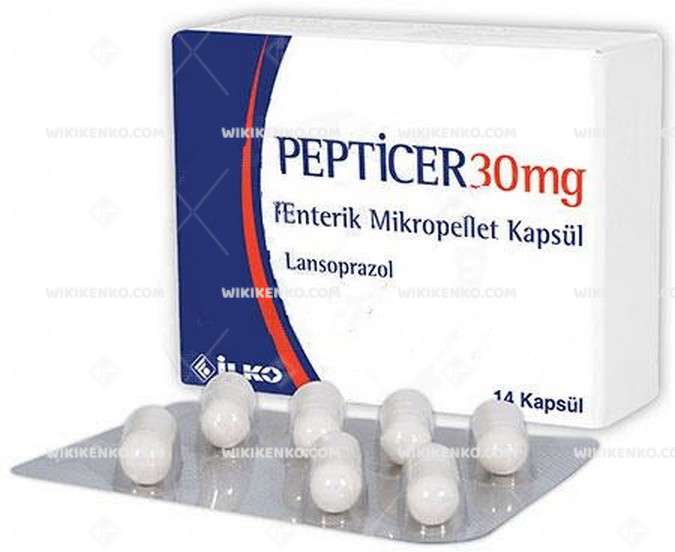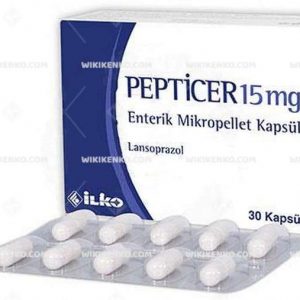Pepticer Enterik Mikropellet Capsule 30 Mg
Pepticer Enterik Mikropellet Capsule 30 Mg, a pharmaceutical gem crafted by Ilko in Turkey, is a stalwart in the realm of digestive system and metabolism management. Let’s delve into the nuances of this medication, from its composition to its manifold applications, dosages, potential side effects, and the all-important query of alcohol interaction.
| Dosage form | |
|---|---|
| Pack size | |
| Potency | 30 Mg |
| Manufacturer | |
| Origin | |
| Generic Name (Ingredient) | Each Capsule Contains 30 Mg Of Lansoprazole As The Active Ingredient. |
Assuming your emergency circumstances for this product, visit Urgent Quotation page. Besides, for any pharmaceutical questions, please ask us in the comments section.
Description
Ingredients: Lansoprazole
At the heart of Pepticer lies Lansoprazole, a potent proton pump inhibitor renowned for its proficiency in curbing excessive stomach acid production. This critical attribute lends itself to the effective management of an array of digestive ailments.
The Versatility of Pepticer
Pepticer emerges as a versatile therapeutic ally, effectively addressing an array of conditions pertaining to the digestive system and metabolism. These encompass:
1. Prevention and Treatment of Duodenal and Gastric Ulcers
Pepticer’s efficacy extends to the realm of ulcer prevention and treatment, encompassing both duodenal and gastric ulcers.
2. Reflux Esophagitis
The distressing condition of reflux esophagitis finds solace in Pepticer’s intervention, reducing the discomfort associated with acid reflux.
3. Ulcers Caused by Helicobacter Pylori Infection
Pepticer’s utility extends to tackling ulcers induced by the notorious Helicobacter pylori infection, aiding in the path to recovery.
4. Prevention and Treatment of Ulcers Induced by NSAIDs
Non-steroidal anti-inflammatory drugs (NSAIDs) like aspirin, ibuprofen, ketoprofen, and piroxicam can often lead to ulcers. Pepticer offers preventive and therapeutic solutions in such cases.
5. Gastroesophageal Reflux Disease (GERD)
GERD, characterized by the regurgitation of stomach acid into the esophagus, inciting damage and inflammation, meets its match in Pepticer’s acid-reducing prowess.
6. Excessive Stomach Acid Secretion
Pepticer’s ambit extends to pathological hypersecretion conditions like Zollinger-Ellison Syndrome, where it adeptly reins in excessive acid secretion.
Dosage and Administration
Pepticer arrives in the form of enteric-coated micro-pellet capsules, characterized by their opaque white appearance, housing white or off-white pellets. These capsules are available in convenient boxes of 14 or 28 capsules. The mechanism of action hinges on the inhibition of acid secretion from acid-secreting cells in the stomach.
Dosage Guidelines
The dosage and duration of Pepticer treatment hinge on the specific ailment under consideration. To ensure optimal outcomes, it is imperative to adhere diligently to your physician’s directives. In broad strokes:
- Duodenal Ulcer: The recommended oral dose is 30 mg once daily for a duration of 2 weeks.
- Gastric Ulcer: A daily dose of 30 mg, administered once daily, is the prescribed course of action, spanning up to 4 weeks.
- Reflux Esophagitis: A 30 mg dose, taken once daily for 4 weeks, is the recommended protocol.
Side Effects
As with any pharmaceutical intervention, Pepticer may introduce side effects in some individuals. It is essential to emphasize that not everyone who embarks on this treatment journey will necessarily experience side effects. Commonly reported side effects include:
- Diarrhea
- Stomach pain
- Constipation
- Nausea
- Headache
Should any of these side effects persist or more unusual symptoms arise, a conversation with your healthcare provider is paramount. They possess the expertise to guide you on side effect management or the necessity to discontinue the medication.
The Alcohol Conundrum
The conjunction of alcohol and medication is a subject of prudence. While it is not explicitly forbidden to consume alcohol while on Pepticer, caution is advised. Alcohol has the potential to interact with a spectrum of medications, potentially heightening side effects or diminishing therapeutic efficacy. It is advisable to seek personalized counsel from your healthcare provider, taking into account your individual health profile.
Conclusion
In conclusion, Pepticer Enterik Mikropellet Capsule 30 Mg emerges as an invaluable asset in the realm of digestive system and metabolism management. Armed with Lansoprazole as its active ingredient, this medication wields precision in addressing an array of conditions. The key to optimizing its benefits lies in meticulous adherence to prescribed dosages, open communication regarding potential side effects, and judicious consideration of alcohol consumption. Professional guidance is the North Star on this path to digestive well-being
Use the form below to report an error
Please answer the questions as thoroughly and accurately as possible. Your answers will help us better understand what kind of mistakes happen, why and where they happen, and in the end the purpose is to build a better archive to guide researchers and professionals around the world.
The information on this page is not intended to be a substitute for professional medical advice, diagnosis, or treatment. always seek the advice for your physician or another qualified health provider with any questions you may have regarding a medical condition. Always remember to
- Ask your own doctor for medical advice.
- Names, brands, and dosage may differ between countries.
- When not feeling well, or experiencing side effects always contact your own doctor.
Cyberchondria
The truth is that when we’re sick, or worried about getting sick, the internet won’t help.
According to Wikipedia, cyberchondria is a mental disorder consisting in the desire to independently make a diagnosis based on the symptoms of diseases described on Internet sites.
Why you can't look for symptoms on the Internet
If diagnoses could be made simply from a textbook or an article on a website, we would all be doctors and treat ourselves. Nothing can replace the experience and knowledge of specially trained people. As in any field, in medicine there are unscrupulous specialists, differences of opinion, inaccurate diagnoses and incorrect test results.




Reviews
There are no reviews yet.